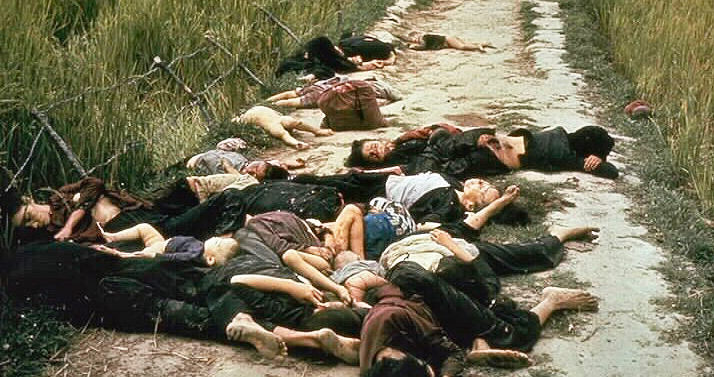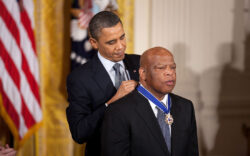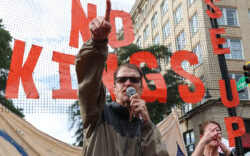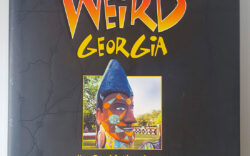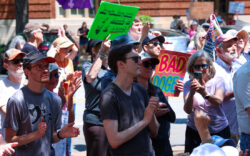On Mar. 16, 1968, American soldiers in Vietnam brought the hell of war to a tiny village called My Lai. The infamous My Lai Massacre of hundreds of Asian civilians by American military men that happened 55 years ago left bloody stains on the history of this nation, but even from that carnage came signs of hope and heroism. Even in the midst of a massacre, there were Americans who stood heroically against the murderers at My Lai. One of those heroes was Larry Colburn.
Speaking to a large downtown crowd at the Athens Human Rights Festival on May 17, 1998—30 years after the massacre—Colburn recalled his time as a gunner on a helicopter with crew chief Glenn Andreotta and pilot Hugh Thompson. When they saw the killings happening on the ground, Thompson landed the chopper, and the three crewmen prevented even more killing by their fellow American military men at My Lai. Speaking respectfully of his pilot 30 years after their wartime experience, Colburn told his Athens audience, “Mr. Thompson was the decision-maker that day, and he led us through it.”
Colburn scorned Army officer William Calley as “guilty of executing civilians” at My Lai, and said that if he could ask Calley one question, it would be: “Why didn’t you tell the truth?”
Colburn told the downtown crowd in 1998 that it didn’t take him long to become skeptical about the Vietnam War that he had experienced as a young man in 1968. “About the second day I was in the country, I had questions about our involvement in Vietnam,” he said.
During comments from the audience, Native American activist and Vietnam veteran Aaron Two-Elk told Colburn that the My Lai Massacre of 1968 was comparable to the grisly Wounded Knee Massacre of 1890, when U.S. Army troops killed scores of Native Americans in South Dakota. Colburn agreed, saying that there was no one willing to stand in the way of marauding troops at Wounded Knee as he and his crewmates had done at My Lai. “If Mr. Thompson had been at Wounded Knee, I’m sure he would have done the same thing he did at My Lai,” said Colburn as the crowd cheered.
Though Colburn condemned military men who committed war crimes at My Lai, he said, “I urge you to open your hearts to the Vietnam veterans who fought honorably in Southeast Asia.” After his speech, Colburn was given handshakes and warm wishes by local civilians, veterans and active-duty military personnel from the U.S. Navy Supply Corps School, which was then located here in Athens.
Not long before he spoke in downtown Athens in 1998, Colburn and his two crewmates had finally received long-overdue recognition when the U.S. Army awarded them the prestigious Soldier’s Medal for their life-saving bravery at My Lai 30 years before. Colburn and Thompson were on hand to receive their medals at a poignant ceremony at the Vietnam Veterans Memorial in Washington. Crew chief Glenn Andreotta was awarded his medal posthumously. He had been killed in action just three weeks after he helped to save lives at My Lai in 1968. After the ceremony, Colburn and Thompson gazed at Andreotta’s name forever etched into the black granite wall of the memorial. They never forgot their crewmate, and they never forgot their war.
Both men would return to Vietnam decades after they had landed their helicopter to interfere with a hellish massacre there. Colburn told his Athens audience that he and Thompson wanted to help build “a living peace park with orchards and fish ponds” on the site of what had been a killing field. The park was dedicated on Mar. 16, 2001—33 years after the massacre at My Lai.
Chopper pilot Hugh Thompson died in 2006. Gunner Larry Colburn died in 2016. Lt. Calley, now 79, the only officer convicted of crimes at My Lai, was sentenced to life in prison but served less than four years in house arrest after the Nixon administration intervened in his case. The memories of My Lai still linger, memories that led Colburn to remind his Athens listeners to “remember the brutality and inhumanity of war.”
Like what you just read? Support Flagpole by making a donation today. Every dollar you give helps fund our ongoing mission to provide Athens with quality, independent journalism.



